
(Photo by Yogendra Singh from Pexels)
HESLINGTON, United Kingdom — Writing stories about plastic litter in the ocean can help children understand how they contribute to the problem, a new study finds. Researchers from the University of York say they found a change in perception when children were encouraged to write about the marine plastic litter surrounding Latin American countries.
The story-writing activity tapped into children’s imaginations as they were asked to think about what kind of litter would be found on a beach or in the ocean. These ranged from toys to garbage like plastic bags, old toothbrushes, bottles, and straws. They also came up with stories on how these items ended up there in the first place.
By imagining how the items made their way into the ocean, the children were able to come up with ways to prevent litter from entering the East Pacific Coast. The study authors found that children focused more on preventing the problem from worsening than on ways to clean up existing litter.
The common solution involved how to properly dispose of litter and recycling. Children explained this could be done in a number of ways from reducing plastic use, reusing items, education, and community advocacy on the dangers of littering.
“Stories offer a new and different way to explore what people believe and how they perceive and make sense of their environment, including in this study, marine plastic litter,” says Estelle Praet from the Department of Archaeology at the University of York, in a university release. “The results were truly inspiring and showed the children’s awareness of plastic's impact on marine life and the environment.”
Does every piece of garbage have a story to tell?
The story-writing activity took place during the COVID-19 lockdowns, and it involved students from the East Pacific Coast as a part of the “Científicos de la Basura” (Litter Scientists) program. A total of 89 children between ages 10 and 18 took part in the study and were from countries along the Pacific Coast, including Chile, Colombia, Costa Rica, Ecuador, Mexico, Panama, and Peru.
The children were given a list of items and asked to create a story around them, keeping in mind the plastic pollution problem. Over half of the stories showed the children possessed some awareness of the harmful effects plastic has on marine life — what would happen if animals ate plastic, got stuck in plastic, or were poisoned from components in plastic. Many of the stories described dire consequences, including injuries, death, environmental impacts as well as how plastics affect the beauty of beaches.
“By viewing these plastic items as artifacts, each with its own story, we can bring this back to the human behaviors that related to the objects' use and their disposal,” says John Schofield, a professor at the department of archaeology at York University. “This project has helped show how we can get that message across to children and hopefully then make a difference.”
3 in 4 stories looked at stopping people from littering
Creating stories around litter had an impact on the children as well. The stories showed clear examples that human behavior is the cause of plastic pollution and the importance of individual action. For example, about 77 percent of the stories talked about solutions people could do to stop plastic littering.
“A key element of our project was to examine the children’s responses to questionnaires they completed before and after writing these stories. We found that their knowledge on the topic increased and they became more proactive, as they reported doing more pro-environmental acts afterwards,” explains Kayleigh Wyles, an environmental psychologist from the University of Plymouth.
The study is published in the journal Marine Pollution Bulletin.











This study was basically measuring the effectiveness of environmental brainwashing techniques. Experimentation in children should be illegal.